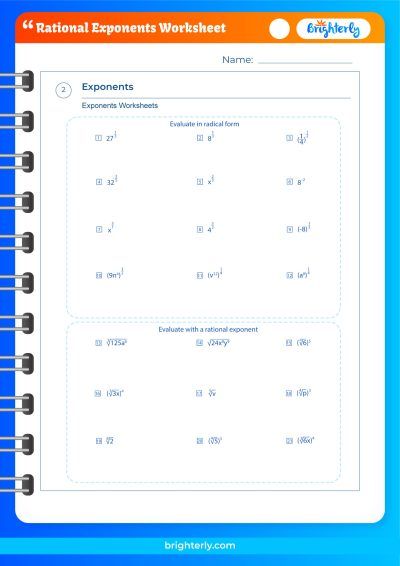Rational Exponents – Formulas, Definition With Examples
Updated on January 2, 2024
Welcome to Brighterly, an interactive online platform dedicated to mathematics for children. Our mission is to make learning math both fun and insightful. In this comprehensive guide, we delve into the world of Rational Exponents. This concept is a cornerstone of algebra and a fascinating part of mathematics. Here, we aim to simplify it with clear explanations, practical examples, and real-world problems that will engage and educate young minds.
What Are Rational Exponents?
Rational Exponents are a way of expressing roots through exponents. This concept simplifies understanding various algebraic operations and is a fundamental aspect of mathematics for children. For instance, (x)^½ represents the square root of x. This expression indicates that finding the square root of a number is the same as raising it to the power of 1/2. Learning how to use rational exponents can simplify complex equations and enhance problem-solving skills in algebra.
To illustrate, consider the expression 16^½. In this case, 16^½=√16=4. This example shows how rational exponents can be used to find square roots easily.
Difference Between Rational and Integral Exponents
In mathematics for children, distinguishing between rational and integral exponents is crucial. Integral exponents, like , suggest multiplication of a number by itself a specified number of times. On the other hand, Rational Exponents, such as , imply finding roots. For example, means x multiplied by itself three times, while means the cube root of x.
Formulas Involving Rational Exponents
Formulas involving Rational Exponents are central to solving various algebraic problems. These formulas are vital tools in mathematics for children, aiding in simplifying expressions and solving equations. For example, the expression (a^(m/n)) * (a^(p/q) can be simplified using rational exponent properties to a^((mp+np)/nq), making calculations more manageable for young learners.
Conversion Between Rational and Radical Form
Conversion between rational and radical forms is essential in mathematics for children. This skill allows students to switch between different forms of expressions, depending on which is more convenient to work with. For example, the rational exponent x^(2/3) can be converted to the radical form as the cube root of x^2, or ³√x².
Operations with Rational Exponents
Operations with Rational Exponents follow specific rules. Understanding these operations is fundamental in mathematics for children. For example, when multiplying two terms with the same base but different rational exponents, you add the exponents. In contrast, when dividing, you subtract the exponents. This understanding helps in solving equations and simplifying expressions involving rational exponents.
Examples of Rational Exponents in Equations
Using Rational Exponents in equations is a critical skill in mathematics for children. For instance, solving the equation x^(2/3) involves first converting the rational exponent into a radical form, leading to ³√x². The solution involves finding the cube root of 8 and then squaring that number to find the value of x.
Practice Problems on Rational Exponents
Engaging with practice problems helps solidify understanding of Rational Exponents. Here are some problems tailored for young learners:
- Simplify (x^½)².
- Find the value of x in x¾=16.
- Convert ⁵√x³ to rational exponent form and simplify.
These problems are designed to reinforce the understanding of rational exponents in mathematics for children.
Frequently Asked Questions on Rational Exponents
What is a rational exponent?
A rational exponent is an exponent that is a fraction, representing both the power and the root of a number.
How do you simplify an expression with rational exponents?
To simplify an expression with rational exponents, use the properties of rational exponents (product rule, quotient rule, power rule).
Can rational exponents be negative?
Yes, rational exponents can be negative, indicating reciprocal roots.






